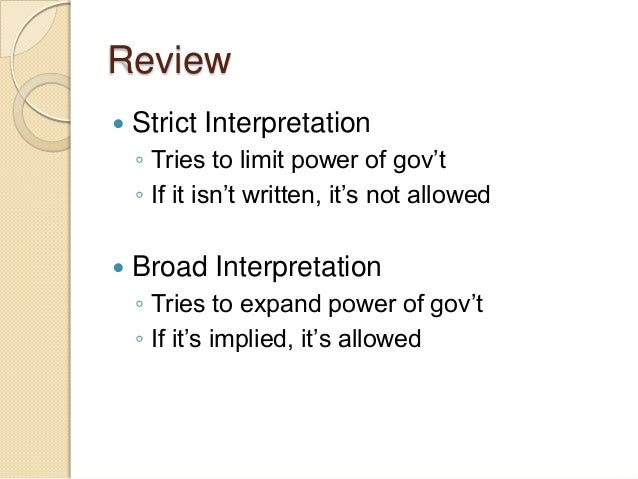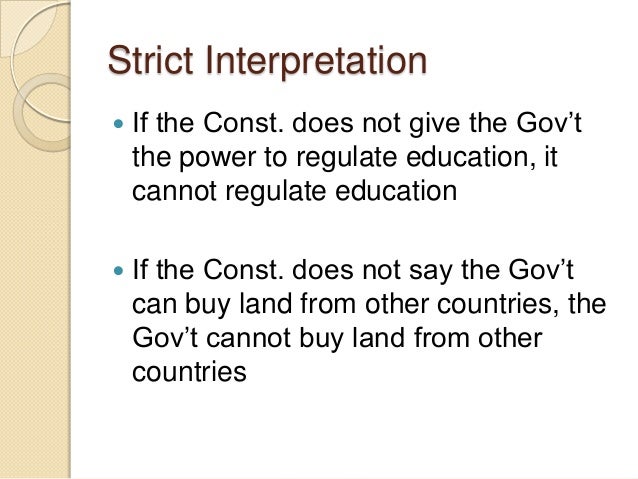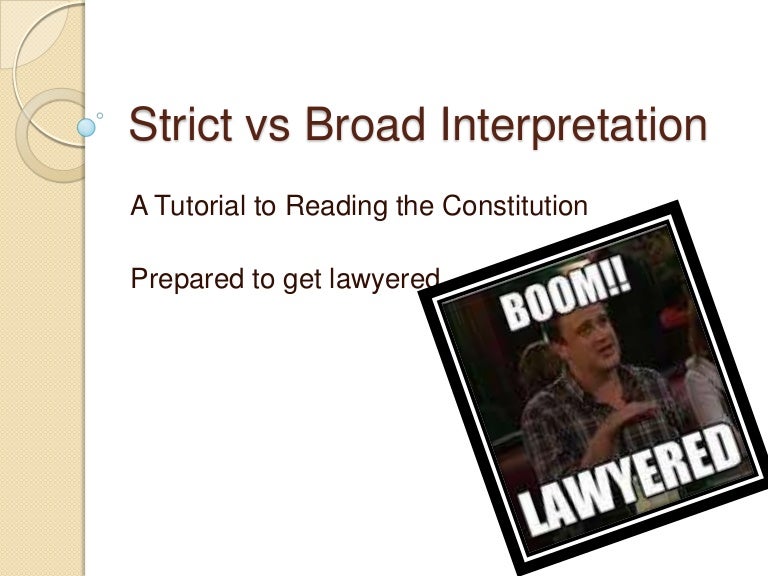The loose construction interpretation of the Constitution refers to the notion that. in carrying out its duties, the central government can take any measure not specifically prohibited by the constitution.
What would be considered a loose interpretation of the Constitution?
Alexander Hamilton and his followers favored a loose interpretation of the Constitution, which meant they believed that the document permitted everything that it did not expressly forbid. This contrasted sharply with Thomas Jefferson's strict interpretation.
Which cabinet member has a loose interpretation of the Constitution?
Nowhere did the Constitution allow for the federal government to create a bank. Hamilton responded with a "loose interpretation" that allowed such federal action under a clause permitting Congress to make "all Laws which shall be necessary and proper."
Which two arguments support loose construction?
Therefore, the correct answers are: - The Necessary and Proper Clause gives the federal government broad powers. - The Constitution should be considered a living document that changes with time.
What is the loose interpretation of the Constitution quizlet?
The Loose interpretation states that the Federal government can do what is good for the country even if the Constitution doesn't explicitly allow it, but the Strict interpretation states that the Federal government can only do what the Constitution says it can do.
What is a strict construction of the Constitution?
Strict construction refers to a philosophy of constitutional interpretation that holds that the Constitution should be interpreted and applied based on a precise reading of the text and the text alone.





What is meant by strict construction?
Strict constructionisim, or original intent, is a theory limiting interpretation of legal and constitutional language to the literal meaning of this language at the time of passage. This theory contrasts with a loose construction of laws, which allows broader discretion by judges to determine intent in legal language.
Frequently Asked Questions
Who favored a strict construction of the Constitution?
Thomas Jefferson
Thomas Jefferson favored a strict interpretation of the Constitution, which he interpreted as forbidding everything it did not expressly permit. In contrast, Hamilton favored a loose interpretation.What is the strict construction argument?
Strict construction requires a judge to apply the text only as it is written. Once the court has a clear meaning of the text, no further investigation is required. Judges—in this view—should avoid drawing inferences from a statute or constitution and focus only on the text itself.
What is the argument between people who believe in loose and strict interpretation of the Constitution?
Loose construction believes in a strong central gov and has a flexible interpretation of the constitution. strict construction believes in the power in the hands of the state/people and dont stretch/change constitution. they both believed that we need a constitution. it sharply challenged the new national gov.
Why is loose construction important?
Loose construction is most closely associated with judges and legal theorists who advocate for a living constitution, meaning a constitution that should be interpreted and applied differently based on historical and social circumstances.
What are the characteristics of loose construction?
Loose construction is the belief that the Constitution is a dynamic, living document that must change as the nation develops. Loose constructionists do not feel bound by the original intent of the Founding Fathers. They argue that the Founders were practical, pragmatic leaders who did not cast doctrine in concrete.
What are the positives and negatives of loose constructionism?
Strict Construction vs. Loose Construction
| Loose Construction | |
|---|---|
| Advantages | Changes are made to fit the social climate and current needs of the time |
| Disadvantages | Can be viewed as highly biased or based on the imagination of the ruling party |
What is strict construction in government?
A strict constructionist is someone who believes that the text of the Constitution is not open to interpretation and that the words in the Constitution are literal. This philosophy is usually associated with the federal judiciary regarding cases that involve Constitutional matters.
What is the difference between loose construction and street construction of the Constitution?
Strict constructionisim, or original intent, is a theory limiting interpretation of legal and constitutional language to the literal meaning of this language at the time of passage. This theory contrasts with a loose construction of laws, which allows broader discretion by judges to determine intent in legal language.
FAQ
- Who believed in loose construction of the Constitution?
Alexander Hamilton
Alexander Hamilton and his followers favored a loose interpretation of the Constitution, which meant they believed that the document permitted everything that it did not expressly forbid. This contrasted sharply with Thomas Jefferson's strict interpretation.- What is an example of a loose construction?
Two examples of loose construction would be the Supreme Court rulings for Roe v. Wade and Brown v. Board of Education, as both of these decisions were made (in majority) by judges who recognized that rights should change to best meet the needs of the time (and the people, of course).
- Who believed in a strict construction of the Constitution?
- President Richard Nixon (1969-1974) and Ronald Reagan (1981-1989) are often thought of as strict constructionists. (Reagan appointed Scalia). Both presidents made judicial appointments of conservative judges a campaign issue. Chief Justice William Rehnquist was also often thought of as a strict constructionist.
- What political party is strict construction?
Thus, politicians who identified themselves as strict constructionists embraced an approach to constitutional interpretation that resembles what we today call originalism. The term began to be used by conservative and moderate Republican presidents, beginning with Richard Nixon in 1968 when he was running for election.
- Which group believed in a strict interpretation of the Constitution?
People who wanted a strict interpretation of the constitution were generally anti federalist and whose viewpoints were represented by Thomas Jefferson. The loose constructionists were people who desired a strong central government with less power to the states.
- What political leader believed in strict construction?
Thomas Jefferson's
Thomas Jefferson's February 15, 1791, opinion on the constitutionality of a national bank is considered one of the stellar statements on the limited powers and strict construction of the Federal Constitution.- Who constructed the Constitution?
Nationalists, led by James Madison, George Washington, Alexander Hamilton, John Jay, and James Wilson, almost immediately began working toward strengthening the federal government. They turned a series of regional commercial conferences into a national constitutional convention at Philadelphia in 1787.
- Who supported a strict construction of the constitution?
- President Richard Nixon (1969-1974) and Ronald Reagan (1981-1989) are often thought of as strict constructionists. (Reagan appointed Scalia). Both presidents made judicial appointments of conservative judges a campaign issue. Chief Justice William Rehnquist was also often thought of as a strict constructionist.
What is the point of strict construction, or interpreting the constitution as literally as possible?
| Which political party supported the constitution? | Opponents (Anti-Federalists) and supporters (Federalists) of the new constitution began to coalesce into political factions. |
| Which party was in support of the new constitution? | The majority of the Founding Fathers were originally Federalists. Alexander Hamilton, James Madison and many others can all be considered Federalists. These Federalists felt that the Articles of Confederation had been too weak to sustain a working government and had decided that a new form of government was needed. |
| What was strict construction and who supported it? | Thus, politicians who identified themselves as strict constructionists embraced an approach to constitutional interpretation that resembles what we today call originalism. The term began to be used by conservative and moderate Republican presidents, beginning with Richard Nixon in 1968 when he was running for election. |
| What is the difference between loose and strict Constitution? | Strict constructionisim, or original intent, is a theory limiting interpretation of legal and constitutional language to the literal meaning of this language at the time of passage. This theory contrasts with a loose construction of laws, which allows broader discretion by judges to determine intent in legal language. |
| What is the difference between strict and loose elastic clause? | Strict constructionists interpret the clause very narrowly, claiming it only gives Congress additional powers without which it could not function. Loose constructionists interpret the clause more broadly, arguing that the clause gives Congress powers that are related to carrying out its enumerated powers. |
| What is the difference between strict and loose construction of the Constitution quizlet? | Strict construction means that the Federal government has very limited powers. What is loose construction (interpretation)? Loose construction means that the Constitution gives the Federal government broad powers to do what is necessary. |
| What does loose constructionist mean? | Loose Constructionism is the judicial philosophy whereby the Constitution is interpreted loosely, typically reading between the lines, to extract a meaning. When practicing loose constructionism, justices will take an issue and look at the context of it, and then at the constitution. |
| What is the importance of loose construction? | Loose construction is most closely associated with judges and legal theorists who advocate for a living constitution, meaning a constitution that should be interpreted and applied differently based on historical and social circumstances. |
- What did Jefferson mean by loose construction?
Like a contract between two or more parties, the Constitution established rights and obligations. The “loose” construction of its terms would defeat the intent of the parties and was inconsistent with State sovereignty. Similarly, Thomas Jefferson laid down two rules for the interpretation of the Constitution.
- What is loose construction in simple terms?
Loose Constructionism is the judicial philosophy whereby the Constitution is interpreted loosely, typically reading between the lines, to extract a meaning. When practicing loose constructionism, justices will take an issue and look at the context of it, and then at the constitution.
- Why is strict constructionist important?
In Criminal Law, application of strict construction is paramount, as it compliments the rule of lenity that limits the scope of statutory interpretation in penal statutes.
- Who favored loose construction?
- Alexander Hamilton and his followers favored a loose interpretation of the Constitution, which meant they believed that the document permitted everything that it did not expressly forbid. This contrasted sharply with Thomas Jefferson's strict interpretation.
- What is a strict construction literal interpretation of the Constitution?
Strict constructionism is a legal philosophy that applies a narrow, or strict, interpretation to a legal text, like the U.S. Constitution. Under strict constructionism, a judge can interpret a text as it is written, considering only what is presented within the four corners of the legal document.
- Why is strict construction important?
In Criminal Law, application of strict construction is paramount, as it compliments the rule of lenity that limits the scope of statutory interpretation in penal statutes.
- What is the literal interpretation of the Constitution?
According to textualism, the most reliable and consistent way to interpret the constitution is not to interpret it. Rather, the word-for-word text of the Constitution should be one's guide. This is the most literal of possible ways to interpret the Constitution.
- What is the strict interpretation of the Constitution quizlet?
What is the definition of the Strict interpretation of the Constitution? The strict interpretation said that the Federal government could only do things expressly said in the constitution.

